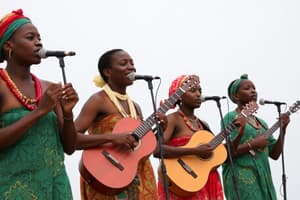Podcast
Questions and Answers
Which of the following is NOT a characteristic commonly found in African music?
Which of the following is NOT a characteristic commonly found in African music?
- Call and response patterns
- Melody-focused compositions (correct)
- Improvisational elements
- Use of polyrhythms
Which of the following instruments is typically associated with traditional African music?
Which of the following instruments is typically associated with traditional African music?
- Saxophone
- Guitar
- Piano
- Djembe (correct)
What aspect of African music often involves participating together in the performance?
What aspect of African music often involves participating together in the performance?
- Strict time signatures
- Solo performance emphasis
- Complex harmonic structures
- Interactive storytelling (correct)
Which genre is most likely associated with traditional African cultural expression?
Which genre is most likely associated with traditional African cultural expression?
Which of these elements plays a prominent role in African music composition?
Which of these elements plays a prominent role in African music composition?
Flashcards
African Music Examples
African Music Examples
Eight examples of music from Africa.
Musical Types
Musical Types
Various styles or genres of music.
Cultural Representation
Cultural Representation
Music often reflects cultural traditions and stories.
Meaning of Music
Meaning of Music
Signup and view all the flashcards
African Music
African Music
Signup and view all the flashcards
Study Notes
General Characteristics of African Music
- African music is incredibly diverse, varying significantly by region and culture.
- It often features complex rhythms, intricate melodies, and percussive instruments.
- Vocalizations are frequently important, often incorporating traditional call-and-response structures.
- Music is often integral to social and cultural events, including ceremonies, celebrations, and storytelling.
Examples of African Music Genres/Styles
- Highlife: A popular music genre originating in Ghana in the 1930s. It typically blends traditional African rhythms with elements of Western popular music, like jazz and swing. Known for its upbeat tempo and danceable rhythms.
- Soukous: A genre from the Central African region, particularly Congo and surrounding areas. Often characterized by strong rhythmic grooves, often incorporating Western musical influences like funk. The emphasis on dance is very important.
- Mbaqanga: This South African style emphasizes rhythmic complexity and a distinct vocal quality. It emerged in the post-apartheid era, blending elements of traditional Zulu music with modern styles. Known for its deep bass-lines and soulful vocals.
- Makossa: Primarily from Cameroon, features a driving rhythm, characterized by heavy percussion and a specific melodic style. It incorporates traditional African elements and has a significant dance following.
- Wolof: From Senegal, this genre incorporates traditional West African instruments and rhythms, often with the use of the Kora, a harp-lute. It is often a combination of social commentary, storytelling, and ceremonial music.
- Griot Music: A tradition predominantly from West Africa, griots serve as oral historians, storytellers, and musicians. Their music and poetry are interwoven with historical chronicles passed down through generations. It varies by location and style.
- Juju: A very popular and complex Nigerian genre. It blends traditional African elements with Western music. It features very intricate guitar sounds, and often vocals with a blend of African elements and English lyrics. It is highly danceable.
- Beninese: Beninese music demonstrates a range of musical styles. It often encompasses percussive instruments and traditional forms, but may also feature instruments like electric guitars, which are influenced by modern trends.
Studying That Suits You
Use AI to generate personalized quizzes and flashcards to suit your learning preferences.




